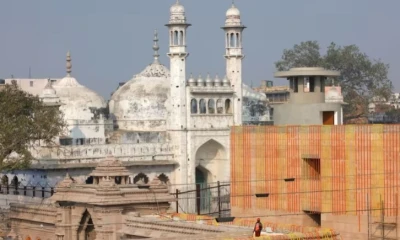Edited by Deepali Verma
Anjuman Intezamia Masajid Committee, responsible for the management of Gyanvapi mosque complex, has made an appeal to the Muslim community to keep their shops closed on January 2 in protest against pooja performed in the southern cellar of the mosque a day after a district court permitted it.
Significantly, a large number of people usually gather to offer namaz on Fridays in the Gyanvapi mosque complex.
Security has been beefed up in the city, as a precautionary measure, given Friday namaz with the police force undergoing flag marches in sensitive areas, said Pragya Pathak, Assistant Police Commissioner of the Dasheshmegh area.
The prayers were performed in a cellar of Varanasi’s Gyanvapi Masjid recently during the nighttime after a district court ruling. This happened hours prior to the mosque committee approaching the Supreme Court and the Allahabad High Court seeking a stay on that order.
The Gyanvapi mosque management committee on February 1 approached the Supreme Court seeking an urgent hearing and challenging the district court order. However, upon the suggestion of the apex court to the committee to move to the Allahabad High Court, it did so later in the day.
Recently, the lower court ruled that a priest can perform prayers before the idols in the southern cellar of the Gyanvapi Masjid, located next to the Kashi Vishwanath temple.
The claims of Hindu litigants were such that an ancient temple was destroyed during Mughal emperor Aurangzeb’s rule to construct a mosque there. A survey conducted by the Archaeological Survey of India is in line with the aforementioned claim as well.
“Vyas ji’s cellar was opened nearly after 31 years for prayers,” Kashi Vishwanath temple trust president Nagendra Pandey said in conversation with PTI after the night prayers. He said the cellar was opened around 10:30 pm.
“It was imperative to adhere to the court’s orders, so the district administration made all arrangements with great promptness,” Pandey said.
Reports reveal that after cleaning the cellar, an ‘aarti’ of Goddess Lakshmi and Lord Ganesh was performed.

















